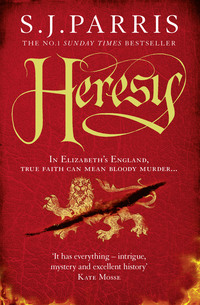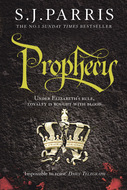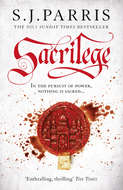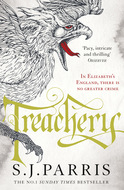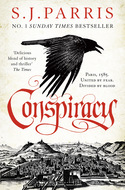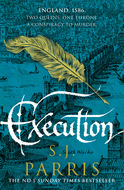Kitap dosya olarak indirilemez ancak uygulamamız üzerinden veya online olarak web sitemizden okunabilir.
Kitabı oku: «Heresy», sayfa 6
Coverdale exchanged a look with Slythurst that I could not read, then folded his hands together.
‘I was saying only that Mercer’s testimony against Allen carried great weight in the trial, not least because he was Allen’s closest confidant. The rector needed Mercer’s cooperation, and in return he was given Allen’s position.’
‘Which should have been yours,’ I prompted.
Coverdale placed a plump hand on his breast and assumed a face of unconvincing modesty.
‘It is not for my own merits that I say an injustice has been done, Doctor Bruno,’ he said, ‘but for the violation to tradition. This university is founded on tradition, and if individuals feel that they are not obliged to respect it because their personal patronage carries more weight, the fabric of our community will crumble.’
‘Edmund was friend to many of us,’ Godwyn said, with an air of regret. A sombre mood had fallen on our group as once again I heard Sophia, Florio and Mercer erupt into laughter. ‘He was greatly liked by the undergraduates, too – it was a pity that he could not in his heart renounce the errors of his old beliefs.’
‘Exile seems a harsh punishment for owning a few books,’ I ventured, helping myself to more beef and onions.
‘He was lucky to leave England with his guts still inside his belly,’ said Slythurst dispassionately. ‘Less favoured men have had harder punishments for less. You of all people, Doctor Bruno, should know that heterodoxy in religion is a most grave sin, against God and the established order.’ He looked at me pointedly.
‘It was not just the books,’ Godwyn interrupted, in a confidential tone. ‘He was suspected of being a courier for his cousin, William Allen, at the English seminary in Rheims. They took him to London and questioned him under cruel torture, but he never said a word and in the end they sent him abroad. Poor Edmund.’ He shook his head sadly and drained his cup.
‘I met his son today,’ I remarked, tearing another piece of bread.
Coverdale rolled his eyes.
‘Then I pity you,’ he said. ‘No doubt he was begging you to carry pleas to the court for his father’s pardon?’ Without waiting for an answer, he clicked his tongue angrily. ‘That boy should never have been allowed to stay on after his father’s disgrace. Thomas Allen holds dangerous beliefs, mark my words. Though I could not persuade the rector to act on my advice – he is too soft-hearted with that boy.’
I could not help thinking that if the rector’s treatment of Thomas Allen was evidence of soft-heartedness, the boy’s life must be harsh indeed.
‘Once again, it behoves me to say that I do not think our eminent guest has travelled all the way here to listen to us griping about college matters,’ Slythurst interrupted in a voice smooth as ice. He tucked a limp strand of hair behind his ear and turned to me, smiling with his teeth. ‘Tell us, Doctor Bruno, something of your travels in Europe. I understand you have taught at many of the famous academies across the continent. How do you find Oxford by comparison?’
Returning his smile with equal insincerity, for the remainder of that course, and the almond custard and jellied fruits that followed, I told them of my wandering years as the candles burned lower, leaving out what I thought politic and subtly flattering my new companions with what they wanted to hear – namely, that none of the European universities could hold a candle to the great scholarship and wisdom of the men of Oxford.
‘How long do you stay in Oxford, Doctor Bruno?’ asked Coverdale, sitting back in his chair and wiping his lips as the servants cleared away the last plates and cups.
‘I believe the palatine, in whose party I travel, intends to stay a week,’ I said.
‘Then I hope you will attend chapel with us here in the college. The rector is delivering a most erudite series of sermons on John Foxe’s Acts and Monuments, are you familiar with it?’
‘The Book of Martyrs? Naturally,’ I replied, suspecting that this was some sort of test. ‘Many consider it a most inspiring work.’
‘Doctor Bruno is not genuine in his admiration, I fear,’ said Slythurst, glancing from me to his colleagues. ‘I never met a Catholic yet who admired Foxe’s dreadful accounts of what was done to the Protestant martyrs.’
‘Does he not also give many examples of Christian martyrs from the earliest centuries of the faith, when Christians suffered at the hands of pagans and unbelievers, before we began persecuting one another?’ I replied. ‘And are these not martyrs whom all Christians may honour, and whose sufferings may remind us of a time when we lived in unity?’
‘That was not Foxe’s intention,’ Slythurst began, but Coverdale interrupted.
‘Well said, Bruno. Believers on both sides have suffered for Christ, and only He knows who shall stand with Him at the Last Judgement.’
‘That is the first time I have ever heard you advocate tolerance, James,’ Slythurst said, his eyes narrowing even further. Coverdale ignored the provocation.
‘Let us have some more wine here, ho!’ he cried to a serving boy, clapping his hands. I declined another glass, for I wanted to reflect on my notes for the disputation before I went to bed and needed to keep a clear head.
By the time the meal was over, it was fully dark outside the windows and the guests all rose, taking their leave with much handshaking and compliments to the rector on the food, which I understood had been greatly superior to the usual fare of the college hall supper. The Fellows all shook my hand warmly, repeating their welcome to Oxford and wishing me a good night’s rest in anticipation of the great disputation the following day, which they were all, they said, much looking forward to. Richard Godwyn invited me to make use of the library whenever I chose, for which I thanked him, John Florio expressed in perfect Italian his eager hopes that we might spend some time together before I left, and even Doctor Bernard rose unsteadily and clasped my fingers between his two bony hands.
‘Tomorrow night, Sorcerer,’ he hissed, with a toothless grin, ‘you will contradict their pious certainties, and I shall be there in the front row applauding you. Not because I support your heretical notions, but because I admire men who are not afraid. There are too few left in this place.’
Here he glanced pointedly at the rector, who affected not to notice. Only Slythurst did not trouble himself to express a welcome; he merely acknowledged me with a curt nod as he disappeared through the doorway, and only then because I caught him looking at me with those cold eyes. I felt again his dislike of me, though I tried not to view it as a personal slight; I noticed that he left without saying goodnight to his colleagues either, and surmised that he was one of those men, common enough among academics, who was simply not blessed with an easy social manner.
When I said goodnight to Sophia, she extended her hand demurely and I kissed it respectfully under her father’s watchful eye, but he was then distracted by Doctor Bernard loudly fretting about where he had left his coat, and while the rector was reassuring Bernard that he had not brought any coat, Sophia leaned close to me and laid a hand on my arm.
‘Doctor Bruno, I should very much like to continue our earlier conversation – you remember? The book of Agrippa? Perhaps when the disputation is over, you may have more leisure to talk. I can often be found in the college library,’ she added. ‘My father allows me to read there in the mornings and the early evenings, when most of the scholars are attending lectures and disputations.’
‘So that you do not distract them from their books?’ I whispered back. She blushed, and gave me a knowing smile.
‘But you will come? There is much I would ask you.’
She looked up at me with a surprising urgency in her eyes, her hand lingering on my arm; I nodded briefly as her father appeared at her shoulder and looked at me enquiringly. I shook his hand, thanked him for the meal and bade the company good night.
I was glad to emerge into the cool of the passageway; the rain had stopped and the night air smelled fresh and inviting after the heavy warmth of the rector’s lodgings. I thought I might walk in the orchard garden to clear my head and digest before retiring, but before I reached the end of the passageway I realised that the iron gate had been closed. When I tried the ring set as a handle, I found it was firmly locked.
‘Doctor Bruno!’ called a voice behind me, and I turned to see Roger Mercer standing at the other end of the passage, by the rector’s door. He took a few paces towards me. ‘You wished to take a turn in the Grove?’ He gestured towards the closed gate.
‘Is this not permitted?’
‘The Grove is for the use of the Fellows only,’ he said, ‘and only we and the rector have keys. It is kept locked at night, for fear the undergraduates would make use of it for all manner of improper trysts. No doubt they find alternative places, if they can slip past the main gate,’ he added with an indulgent smile.
‘They are not allowed out of the college at night?’ I asked. ‘That does seem a hard confinement on men in the prime of youth.’
‘It is meant to teach them self-discipline,’ Mercer said. ‘Most of them find ways around the rules, though – I know I did at their age.’ He chuckled. ‘Cobbett the porter is a good old man, he’s been here for years, but he is willing to look the other way for a few coins if the young ones come back from town after the gates are locked. He likes a drink, too, Cobbett – sometimes I think he conveniently forgets to lock the gate altogether.’
‘Does the rector not discipline him?’
‘The rector is severe in some matters, but in others he shows a shrewd understanding of how best to manage a community of young men. A rod of iron is not always the wisest course – sometimes good leadership is a matter of knowing when to turn a blind eye. Young men will go to taverns and whorehouses whether we like it or no, and the greater the force used in prohibition, the greater the allure.’
‘As Doctor Bernard said about forbidden books,’ I mused.
Mercer glanced at me sideways as we emerged from the other end of the passage into the open courtyard, where the clock on the north range proclaimed the hour to be almost nine.
‘You must excuse Doctor Bernard some of his harshness,’ he said, apologetically. ‘He has had to change his religion three times under four different sovereigns. He was ordained priest in his youth, you know, before the queen’s father broke with Rome. But he grows more and more outspoken of late, and I begin to suspect that he suffers that affliction of old men, where he is sometimes lost in memory and not clear to whom he speaks.’
‘He seemed lucid enough to me. But angry.’
‘Yes.’ Mercer sighed. ‘He is angry – at the world, the university, at what has been demanded of him and at himself for what he has done. And you must be wondering at his anger towards me.’ He glanced at me again, almost timid.
‘He spoke bitterly of exile.’
‘He meant the trouble last year over our sub-rector, Edmund Allen, I expect you have heard. William was close to him, as was I, but I was obliged to testify against him to the Chancellor’s Court for certain matters regarding his religious practices. William considers this an unforgivable betrayal.’
‘And you?’ I asked softly.
Mercer gave a small, bitter laugh.
‘Oh, I acted according to my duty and to save my skin, and now I have the sub-rector’s gown and his well-appointed room in the tower. William was right. I betrayed a friend. But I had no choice, and neither did he. You see the life we have here, Bruno?’ He gestured at the windows of the rector’s lodgings, still glowing with amber light from the candles. ‘It is a good life, a comfortable life for a scholar – we are sheltered in many ways from the world. And I – I am not fitted for any work but the life of books and learning, I lack the worldly ambition to push myself forward. If I had not publicly condemned my friend for his perfidy in religion, I would have shared his fate and lost everything. And at that point his fate was not known – the Privy Council allowed the university to conduct his trial, but there was every chance the matter would be handed to them and Edmund might have been facing a worse punishment than exile.’ He shuddered. ‘So I am not proud of my actions, no, but William Bernard has no right to rail against me. When Her Majesty took the throne and ended her sister Mary’s brief reconciliation with Rome, there was a great purge in the university – all the Catholic Fellows and heads of colleges appointed by Mary were deprived of office unless they renounced the pope’s authority and swore the Oath of Supremacy. William swore it quickly enough, and that oath bought him twenty-five peaceful years in this place, while his more steadfast friends were scattered to the four winds.’
‘And yet, in the winter of his life, it seems clear enough to anyone listening that his heart returns to the old faith.’
‘I think, as he nears death, he grows less concerned with the fate of his body and more fearful for his soul,’ Mercer said. ‘Perhaps if we all saw our death so close at hand, we might choose a different course, but alas, while we breathe our fears are all for our poor, weak flesh and our worldly status.’
‘Perhaps so. But it is the son who seems to suffer it most,’ I observed.
‘You have met Thomas? That poor boy. He is a very able scholar, you know. At least, he was.’ Mercer ran both hands over his face as if washing it, a gesture of hopelessness. ‘I have known him since he first came to Oxford at fifteen – before his father left for Rheims, he charged me to care for Thomas like a father in his absence. Edmund understood why I had to act as I did – he forgave me. But Thomas will not forgive me for my part in Edmund’s trial. I have tried to help him – with such gifts of money as are in my power, I mean – but he would rather humiliate himself slaving for that young peacock Norris than accept a penny. When I pass him in the courtyard he does not even acknowledge me, but I feel the hatred burning in him like a furnace.’
‘That is hard,’ I said. ‘But he is young, and the passions of the young are often as brief as they are fierce. Perhaps he will forgive you in time.’
I bowed then and moved towards my staircase, keen to get to work before the hour grew too late. Mercer stepped towards me and grasped my hand.
‘I hope we will have a chance to talk further, Doctor Bruno,’ he said. ‘I am truly glad to have met you, and I hope I did not sound too sanctimonious in my disapproval this evening when we spoke of Agrippa and the Hermetic treatises.’
‘Oh, I am quite used to disapproval,’ I said, waving away his apology with a smile.
‘You mistake my meaning. The rector is a pious man and, as I say, he can be severe when he chooses – it is prudent for those whose position depends on his good opinion to express views that accord with his own when at his table. But I have long had a great interest in these works – as a scholar, I mean, for I believe that one can study the occult philosophies objectively yet still remain a good Christian. Is it not so, Bruno?’
‘Ficino thought so,’ I replied. ‘And I hope he was right, Doctor Mercer, else I am damned.’
‘Please – call me Roger,’ he said warmly. ‘Well, I shall look forward to our next discussion on these matters.’
With that, he bowed and strode away across the courtyard. I turned towards my room just as fat drops of rain began once more to fall from a brooding sky.
FOUR
I read and revised my notes for the disputation until my lamp burned out, and afterwards I slept fitfully; the room was cold and the rain lashed hard against the panes as the timbers creaked. So it was that when I was disturbed by a great noise during a brief slumber I was at first not sure if it was morning or merely a hallucination of my confused dreams. Gradually, though, the noise became more insistent, and as I awakened to see that it was not yet dawn, I realised that the infernal riot outside my windows was the frenzied sound of a barking dog. I pulled the sheet closer around me, cursing the rector or whomever had thought to keep such a feral animal in the college grounds and curled up in the hope of recovering my ruined sleep, when a second sound joined that bestial dawn chorus, one that I have never forgotten and still, sometimes, hear in dreams. It was the blood-chilling scream of a human being in pain and mortal terror, and it rose in pitch and agony as the creature’s barking grew wilder and more vicious.
As the horror of those combined sounds dispelled the last vapours of sleep, I realised that someone not far from my windows was in fear of their life; I supposed it must be some intruder, surprised perhaps by a watchdog, but I could not ignore it, so I hastily pulled on my breeches and a shirt and set out to find the source of this consternation and see if I might offer assistance.
I emerged from my staircase into the shadowy courtyard; the heavy clouds were broken with veins of pale light and the rain, for the moment, had abated, leaving behind a silvery mist that hung thick in the morning air so that I could barely make out the clock on the north range opposite and had to step forward to read its hands: almost five. The dreadful noise of the hound continued and from other staircases around the main courtyard figures appeared through the vapour as young men, with hose pulled on under their nightshirts and hair disarrayed, timidly gathered in groups, whispering to one another, unsure whether to come any closer. The din was unmistakeably coming from the passageway in the east range that led to the rector’s lodgings and the Grove, the Fellows’ garden I had explored the previous evening. Gathering my wits, I ran the length of the passage to the iron gate, where I found two young men pulling at the handle, to no avail, and peering into the misty depths of the garden. Hearing my footsteps, they turned, their faces ashen.
‘Someone is in there, sir, with a wild beast!’ cried the taller. ‘I had just risen to wash when I heard his cries, but from here we can see nothing.’
‘We do not have a key!’ the other said frantically. ‘Only the senior men do, and the door is fast.’
‘Then we must wake one of the senior men,’ I said, wondering how the rector, whose lodgings must have windows on to the garden, could possibly be sleeping through this tumult. ‘You must know where their rooms are – quick, go and wake anyone who could open the gate. Is there another entrance?’
‘Two, sir,’ said the tall student, terrified, while his friend scuttled away up the passage in search of help. ‘Another gate like this from the passage at the other end of the hall, by the kitchens, and a door in the garden wall from Brasenose Lane, but they are all locked at night.’
‘Well, the man in there must have got in somehow,’ I said, urgently, as a throttled voice unmistakeably cried, ‘Jesu, save me! Holy Mother, save me!’ Another scream rent the air, followed by mangled cries for help, then a ferocious growling and a truly inhuman sound, a strangled gurgling that seemed to last for minutes. A small crowd of curious and agitated undergraduates was forming behind us when I heard the rector’s voice crying, ‘Let me through, I say!’
His face was puffy and bleary with sleep, a coat thrown over his nightgown, and he carried in his hand a bunch of keys. He started when he saw me.
‘Oh – Doctor Bruno – what is this ungodly disturbance? Who is within – can you see anything? I tried to look from my windows, but the mist and the trees hide all else from sight.’
‘I can see nothing, but it seems that a wild animal is savaging someone in the garden. He must be helped, and quickly!’
The rector stared at me as if I had just told him a herd of cows had flown over the college; then he collected himself and stepped towards the gate with his keys, but just as suddenly he stopped and turned back to me, his face tight with fear. The terrible snarling and barking continued within, but the human sounds had tailed off. I feared the worst.
‘But – but then it would be folly to enter without a weapon if a wild dog is on the loose!’ the rector stammered. ‘It must be killed – someone must fetch the constable or a serjeant-at-arms, who can bring a crossbow. One of you – quickly!’ he snapped at the crowd of half-dressed boys who stood at the end of the passageway, staring, open-mouthed. ‘Go for the constable – immediately!’ They all looked at one another before a couple of them ran out to the courtyard.
‘Could we not find a stick or a poker, anything? We must go in, Rector – I fear we may already be too late for the poor wretch trapped in there,’ I urged, holding out a hand for the keys.
The rector looked around in panic.
‘But – how could there be a dog in the garden?’ he asked, as if to himself, his brows knit in perplexity.
‘Is it not a watch dog, to keep out intruders?’ I asked, now puzzled myself. ‘Could it not be some thief who has scaled the wall, perhaps?’
‘But there is no watch dog,’ the rector said, his voice tight with panic. ‘The porter has a dog, but it is an old, blind creature that has only the use of three legs and it sleeps in his lodge by the main gate. No one else in college is permitted to keep an animal.’ He shook his head, unable to make sense of the evidence of his own ears; the beast in the garden went on making its hellish noise.
‘Step aside there,’ said a calm voice behind us, and the gaggle of students crowded in the passageway parted to reveal a tall young man with shoulder-length fair hair, dressed incongruously in a fine doublet and breeches, black silk slashed to show a rich crimson lining and topped with an elaborate ruff, looking for all the world as if he were off to a dance or a playhouse in London, not hastily risen like the rest of us in all the confusion. In one hand he carried an English longbow, of the kind the nobility use for the hunt, taller than himself and ornately carved with gilded inlays and green and scarlet tracery. In the other he held a leather quiver of arrows decorated with the same design of curlicued vines and gilt leaves.
‘Gabriel Norris!’ exclaimed the rector, staring at the longbow. ‘What is this?’
‘You must open the gate, Doctor Underhill,’ commanded the young man, ‘there is no time to lose, a man’s life is in danger.’
He spoke in measured tones, despite the urgency of the situation, as if he and not the rector held the authority here; half-dazed, the rector unlocked the gate and the young man stepped through, fitting an arrow to his bow as he did so. I followed him hesitantly, and the rector fell in behind me, keeping close to the wall.
The mist hung heavily between the twisted trunks of the apple trees, playing tricks on my eyes with its shifting shapes. Stepping cautiously through the blue shadows, I glimpsed suddenly towards the furthest north-east corner the movement of a large, long-legged dog – by its shape a wolfhound of sorts, I thought, though I could not see clearly. I kept close to the wall as this Gabriel, conspicuous in his gaudy clothes, advanced in steady paces towards the animal, which was still growling and shaking between its teeth a limp black object at its feet. As I moved closer, the mist thinned and I was able to see the animal clearly; its jaws were bloody and daubed with shreds of torn flesh. My heart sank then and my stomach convulsed, for I knew we were too late. The young man paused a few paces away; the dog, catching a scent or a sound, paused in the mauling of its prey and raised its head. For the briefest moment, its snarling ceased and it made a movement towards the young man; as it did so, he let the arrow fly. He was a good shot, despite the thick air, and the animal crumpled to the ground as the arrow-head tore through its neck.
As soon as it fell, Gabriel dropped his bow and we both rushed to the black heap that lay up against the wall, beside the animal’s corpse. It was the body of a man, lying face down, his black academic gown spread out around him, the grass all torn and soaked with a quantity of blood around the body. I helped Gabriel roll the man over, and cried out suddenly in shock. Here was Roger Mercer, his head bent at a hideous angle, eyes staring to the sky, his throat quite torn out – a flap of flesh hung open, raw tissue protruding from the wound. Instinctively I reached out to staunch the blood that still seeped down his neck and breast, but it was too late – the eyes were motionless, fixed forever in a stare of terror. Gabriel Norris jumped back from the bloody corpse, checking anxiously to see that he had got no gore on his clothes, as if this were his only concern. Preening little peacock, I thought in disgust – then remembered where I had heard his name before; Mercer himself had referred to him the night before in exactly the same terms. I crouched in disbelief by the body, taking in the ravaged hands – two of the fingers near bitten off where he had tried to fight the animal away – the chunks of flesh torn from the legs and ankles where it had dragged him to the ground, that horrifically mauled gullet.
The rector came cautiously towards us, a handkerchief clutched over his mouth.
‘Is he …?’
‘We came too late, God have mercy on his soul,’ I said, more from custom than piety. The rector moved close enough to identify the mutilated body of the man who had sat at his right hand only the night before at dinner, and was immediately sick. The young man called Gabriel seemed to have recovered himself, and was probing the corpse of the dog with his toe.
‘A giant of a beast,’ he said, with a note almost of pride, as if he were displaying it as a hunting trophy. Peering more closely, it struck me: hunting was the apt image.
‘This is a hunting dog,’ I said, kneeling beside it. ‘And look, here.’ I pointed to where its ribs protruded painfully under its wiry grey pelt. ‘See how thin it is – it looks as if it was starving. And look at its leg.’ A ring of raw flesh ran around the top of the dog’s left hind leg where the skin had been brutally chafed by a tether of some kind. The fur around the wound was patchy and torn, as if the dog had tried repeatedly to tear off its fetter with its own teeth. ‘It has been chained up, I think – you see? No wonder it went so crazed.’
‘What was it doing in the garden, though?’ the young man asked, looking at me expectantly. ‘And why was Doctor Mercer here with a dog?’
‘Perhaps he was walking his dog and it suddenly turned on him – dogs are sometimes unpredictable,’ I suggested, unpersuaded by my own hypothesis.
‘But Roger didn’t have a dog,’ the rector said in a weak voice, wiping his mouth with his handkerchief. ‘I told you – no one in the college, save the porter, is allowed to keep an animal. No – no, gentlemen, there is nothing to see here!’ he cried suddenly, as the scholars began crowding through the narrow gate into the garden, intent on seeing the spectacle. ‘Back to your rooms, all of you! Chapel at six as normal – back to your rooms and make yourselves ready, I say!’
The students reluctantly turned and shuffled back through the gate, casting glances over their shoulders and murmuring among themselves in animated tones. The rector turned then to the young man, who stood contemplating the corpses, the quiver still dangling from his shoulder; an expression of disbelief spread over the rector’s face, as if he were only now seeing the young man clearly for the first time.
‘Gabriel Norris!’ he exploded, flapping a hand frantically. ‘What in God’s name are you wearing?’
Norris looked down at his flamboyant doublet and hose, then shifted his feet as if embarrassed.
‘I think now is not the time, Doctor Underhill,’ he began, but the rector cut him off.
‘You know perfectly well the Earl of Leicester’s edict about the rules of dress for undergraduates! And I am charged with enforcing it – would you have us both disciplined by the Chancellor’s Court, after all that has happened?’ His face had turned the shade of beetroot, his voice strangulated; I could not help but think that this was an overreaction, in the circumstances. ‘No ruffs, no silks, no velvets, no cuts in doublet or hose!’ he continued, his pitch rising with every item. ‘And no weapons! You deliberately flaunt every rule laid down regarding apparel! This is a community of scholars, Master Norris, not some ball at court for you to flaunt your wealth!’
The young man pursed his lips and looked surly. Even in this attitude of petulance, I saw that he was exceptionally handsome and was clearly used to having his own way.
‘This community of scholars could not do without my wealth, as you well know, Rector. And you overcharge us as it is – I am forced to eat like a pauper here, must I also dress like one?’
The rector, chastened, lowered his voice.
‘You must dress as the Earl of Leicester deems fitting for an Oxford man,’ he said. ‘Now please make haste and change – if you are reported we will both be in trouble and how shall I explain …?’ He broke off there, looking around him helplessly at the two bodies, and I saw that his hands were shaking badly; I suspected he was in shock.
Gabriel Norris looked at me for a moment, as if reluctant to leave the scene of his heroism, then perhaps thought better of it and with some haste picked up his bow and turned to go.
‘Master Norris!’ the rector called after him.
The young man turned defiantly.
‘Yes, Rector?’
‘A longbow? Why in the Lord’s name do you even have a bow and arrows in college?’
Norris shrugged.
